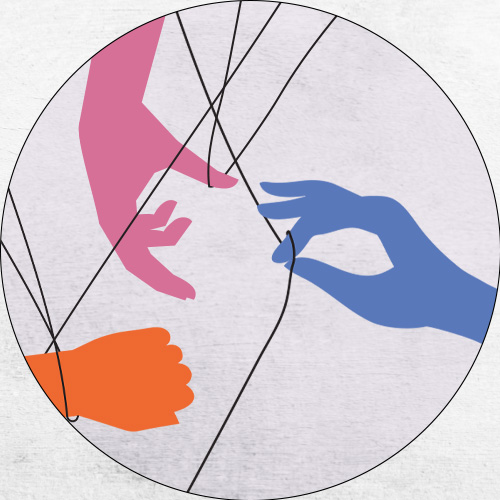For Granted: Chapter 13
| October 24, 2023She was still taken aback by the pettiness of Dini’s reaction earlier today

Ayala flipped through the Newcomer’s Guide, searching for familiar names; even someone as socially reclusive as she ought to know some people in Yerushalayim. After all, she’d lived there for three whole years. She squinted at Laufer, Moishe and Rina; hadn’t there been a Laufer from Ramat Eshkol in the twins’ daycare?
Ayala bit her lip. Even if it was the same person, how bizarre would it be to call her out of the blue after 11 years and ask her if she’d like to make a meal on behalf of Chesed Tzirel?
Way too bizarre. And, come to think of it, the name might have been Levenstein.
She threw down the phonebook. This was ridiculous. How was she supposed to arrange meals for a family that lived all the way in Sanhedria Murchevet?
Her twins, who were washing and drying the dinner dishes, looked at her in surprise at the sound of the thud on the table.
Ayala blushed. “Sorry, the book slipped.”
Layale raised her eyebrow. “Something wrong?”
“Nah, all’s good.”
At their identical incredulous looks, Ayala gave in. “Okay, I’m trying to arrange meals for a family in Yerushalayim, and I don’t know who to call.”
“Doesn’t Mrs. Blumenfeld usually do that?” Tziri asked.
Ayala looked away. “Yeah, but she’s too busy right now, so I’m taking care of it.”
She was still taken aback by the pettiness of Dini’s reaction earlier today. I’ll have to think about whether I have the time to take this on right now. Fine, she’d wanted to respond. Let’s all take a moment to acknowledge your shock that I didn’t jump for joy over your unilateral decision that I quit my job. Now can we get over it and focus on what’s really important?
But, of course, all she’d said was a quiet, “No problem, I’ll do it, then.”
She suspected that Dini had hung up just as dissatisfied from the conversation as Ayala was.
“I don’t get it,” Layale said. “Why are you searching in the phonebook for names to call? Don’t you have, like, a list of volunteers?”
Ayala frowned. “I don’t have the list. Dini does,” she mumbled.
Ayala only now realized what a mistake it was not to have created shared documents of such important information as their volunteer database. She couldn’t understand how she’d allowed such an essential element of the organization to have slipped out of her control. It was very nice that Dini had assumed responsibility for the meal arrangements all these years — but this little temper tantrum of hers only highlighted that, when all was said and done, Chesed Tzirel was Ayala’s baby, not Dini’s.
Layale’s eyes crinkled. “So ask her for it!”
Ayala picked up the Newcomer’s Guide once more. How could she tell Layale that she couldn’t, wouldn’t, ask Dini for such a reasonable request? That if Dini wished to step back from the organization, Ayala needed to demonstrate that she could handle things on her own?
She flipped through the pages randomly. Newman? Steinmetz? Weiner? Was she totally pathetic that she knew nobody? The only Yerushalayim residents she could think of were the families that Chesed Tzirel had helped in the past, and she refused, on principle, to ask them. She and Dini had argued about this several times; Dini insisted that their former chesed recipients were the obvious candidates to help current ones, but Ayala felt strongly that this would unfairly put them on the spot. “Giving,” she’d told Dini, “needs to be unconditional.”
She rubbed her forehead. There was really only one solution: She would just have to make all the Schwartzes meals herself.
“It’s not a big deal,” Ayala had told Naftali when he’d walked into the kitchen after night seder and questioned why she was chopping zucchini at 11 p.m. “Really, in a way it’s easier to cook all the meals myself rather than make a million phone calls. All it means is making our own dinner in advance, with portions for another four people. Which isn’t a bad thing, right?”
Glancing around at the chicken and rice cooling on the counter and the cookies in the oven, he’d commented mildly, “Since when do we have three-course dinners?”
Okay, so maybe it was more than just a matter of increasing the quantities of her normally simple dinners. But the extra food really wasn’t such a big deal, she thought now, as she sat on the 619 bus, one hand balancing a bag of stacked plastic containers on her lap and the other covering a wide yawn. What was a big deal was making the trip into Yerushalayim and back, every day. And once she reached the Schwartz home, she couldn’t just drop off the food and leave. A volunteer could do that, but how could she, as the head of Chesed Tzirel, not stay to talk to Leora and hear about her husband’s medical updates, and maybe even lend her a hand during the busy dinner hour?
It would only be for a week, she told herself. After a week, it was reasonable to call Dini again and see if she could take over. Surely after a week her resentment would have subsided. Right?
“We’re saying Tehillim for Shani’s Abba,” Tamar commented, her mouth full of grilled pargit.
“Eeww!” shrieked Chaviva, as a piece of chicken flew out of Tamar’s mouth.
“Swallow your food before you speak,” Dini said automatically, swiping the chicken bit off the dinner table. “What’s that you said?”
Tamar swallowed and glared at Chaviva, who was making exaggerated gagging noises. “We’re saying Tehillim for Shani’s Abba in school,” she repeated.
Dini looked at her third grader. “Oh? What’s Shani’s last name?”
“Schwartz. Shani said her Abba is in the hospital.”
“I’m sorry to hear. Did Shani say what’s wrong with him?”
Tamar shook her head. “Only that he’s very sick and Hamorah Racheli wrote his name on the board in big letters.”
Dini tilted her head. “Schwartz? Do I know them? Where do they live?”
“Sanhedria Murchevet. They’re American like us.”
Shuki looked up. “A Chesed Tzirel candidate?” he asked her.
She shifted in her seat uncomfortably. She hadn’t told Shuki about her conversation with Ayala the other day; she still blushed whenever she thought of it. How totally childish she’d sounded, declaring she wouldn’t arrange meals for a family in need just because she was offended. And Ayala, always the adult in the room, had refused to take the bait, had calmly said that she’d do it herself — which had infuriated Dini even more. Why couldn’t Ayala have gasped, gotten defensive, or reacted in some way to show that she’d heard the message that Dini was hurt?
Still, later that evening, Dini had felt ashamed enough that she’d decided to call Ayala and tell her she’d discovered she did have the time after all. But just at that moment, she’d received a WhatsApp from Adele Samson. Hi, Dini. Pleasure speaking the other day. Tell me where to send the first month’s payment.
And just like that, she was punched in the gut once more with the force of Ayala’s insulting lack of gratitude. Instead of calling her, Dini had spent the next hour deliberating over how to respond to Adele. In the end, she’d gone with Shuki’s advice to accept the money and say nothing about any change of plans. “I guess we can find other ways to put it to use,” Dini had conceded. “Are you kidding?” Shuki had snorted. “Ten to one, she’ll take the salary in the end. Just you watch.”
But that was three days ago; her anger had had enough time to dissipate since then.
Now she said, “Yeah, they might be. You think I should call them and let them know about our organization?”
It was funny; for all that Dini was the outgoing, sociable one of the pair, it was Ayala who cold-called families when she heard about an illness and offered their services. To Dini, it felt intrusive reaching out to strangers at such a vulnerable time. But that was silly; this was exactly when they needed help most, and there was nothing like feeling an official organization had their back at a time like this. That was the beauty — the magic — of Chesed Tzirel.
Dini straightened her shoulders. “Yes, I’ll call.” She retrieved Tamar’s class list from the kitchen drawer and, before she lost her nerve, dialed.
“Hello, Mrs. Schwartz? This is Dini Blumenfeld. My daughter Tamar is in Shani’s class. I’m so sorry to hear about your husband’s illness.”
“Thank you. Yeah, it’s been pretty crazy here, ever since my husband’s diagnosis.”
“I’m sure.” Dini took a breath. “I’m calling to let you know about an organization I’m involved with, if you need meals, or babysitters, or help with speaking to doctors or other support like that. It’s called Chesed Tzirel.”
To her surprise, the woman on the other end laughed. “Thanks, but I’ve already contacted your organization. I’m in touch with Ayala, she’s been fabulously helpful! She’s been bringing me dinner every day this week.”
“Every day?” Dini echoed. She frowned. No, it couldn’t be. Heart beating uncomfortably, she clarified, “You mean she’s been sending different volunteers to you each night with dinner?”
But even as she said this, it hit her that Ayala didn’t even have the volunteer list. Who could she have asked to cook for the Schwartz family — her neighbors in RBS?
“No, she’s been coming herself every afternoon. And she’s such a tzadeikes, she even stays to watch my kids so that I can rest. See, I work American hours, and normally I nap in the mornings so that I can work at night, but now I’ve been spending each morning in the hospital. Believe me, with everything going on, I wish I could drop my job completely, but I can’t afford to.”
“Mm-hmm,” Dini murmured compassionately. She could just picture Ayala rolling her eyes right now at Dini and muttering some sarcastic line about appreciating real people’s money problems. Which Dini had always protested was totally unfair, even while deep down she’d wondered if Ayala was right.
Ayala the tzadeikes. Doing everything herself, including schlepping into Yerushalayim every single afternoon by bus.
What had Dini even been thinking, daring to suggest that Superwoman lighten her burden by dropping her speech job?
Dini thought of Adele’s four thousand dollars, now sitting in her bank account, and suddenly, inspiration struck.
“I totally hear how difficult it must be having to work right now while dealing with a medical crisis. If you’d like to take a—” what was that official term? “—um, leave of absence, our organization has a fund to provide you with money to tide you over until you’re able to go back to work.”
She heard Leora Schwartz suck in her breath. “Oh. Wow! Really? I didn’t know you offered that! That sounds like exactly what I need! Let me look into the logistics and get back to you, okay?”
“Sure,” Dini said, glowing inside. Finally, someone appreciated her help.
To be continued…
(Originally featured in Family First, Issue 865)
Oops! We could not locate your form.



